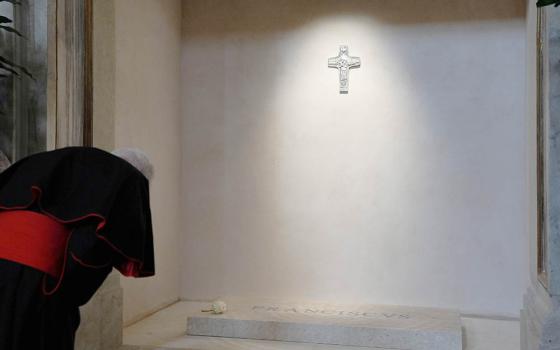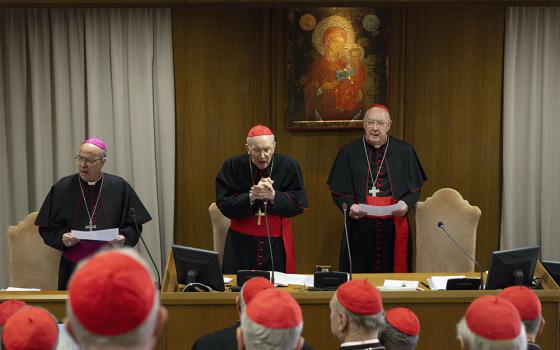Repeated calls from Pope Francis for the world to empty its nuclear weapons arsenals are little known and often overlooked, but carry the moral weight of Catholic social teaching, a panel of experts concurred during a panel discussion at the Council on Foreign Relations.
His pleas should come as no surprise because they reflect a view that has existed within the Holy See since the papacy of St. John XXIII and the days of the Second Vatican Council, said Bishop Oscar Cantu of Las Cruces, New Mexico, chairman of the U.S bishops' Committee on International Justice and Peace, during a program in advance of the pope's visit to the United States Sept. 22-27.
Citing statements from Vatican II, Francis and his predecessors and pastoral letters by the U.S. bishops, Cantu said Thursday that the church has offered consistent messages that question the morality of the use of nuclear weapons.
More recently, the Vatican and Francis have moved away from accepting the concept of nuclear deterrence, saying that such acceptance implies that it is acceptable to use such weapons. The Vatican has always maintained that using nuclear weapons is immoral.
Acknowledging that new perception, Maryann Cusimano Love, associate professor of international relations at The Catholic University of America, said the Holy See is working to reframe the way the world views nuclear weapons and "to put people first."
Such statements are hardly political in nature, but rather reflect the moral and ethical dimensions of weapon production and stockpiling in the face of great human need in much of the world, she said.
"If we think of the four Ps, the letter P, that is in the hallmark of Francis' papacy -- concern for people and the poor, concern for planet and concern for peace -- he sees these not as separate tracks or separate portions of a platform, but he sees them as deeply connected. These are all part of his common concerns," Cusimano Love said.
While agreements such as the New START treaty between the U.S. and Russia, signed in 2010, call for both countries to reduce their strategic nuclear arsenals to 1,550 each from 2,200 each, Francis has said that the mere possession of such weapons represents a "theft from the poor."
"He's trying to poke our consciences, poke our indifference," Cusimano Love said.
Francis is saying it is time to counter the "logic of fear" with a "logic of solidarity" with the marginalized people of the world, she explained, while discerning "the signs of the times, to seize the opportunity and look far ahead," when he says that nuclear deterrence and the threat of mutually assured destruction must no longer be the basis for a secured peace
"He is ... identifying himself as a son of Vatican II and saying we need to look at the signs of the times, interpreting the Gospel in light of these times and coming up with answers that make better sense for our age and our century," she said.
The third panelist, Sam Nunn, co-chairman and CEO of Nuclear Threat Initiative, welcomed the church's work to raise moral questions about the world's nuclear arsenals.
"Those of us involved in this (work) every day really need the help of religious and moral leaders to make sure the policies are not so abstract and arcane," he said.
Nunn, a former senator who chaired the Senate Committee on Armed Services, maintained that the only way to have a safe world is by total nuclear disarmament.
He has worked since 2007 with former Secretary of State George Shultz, former Defense Secretary William Perry, former Secretary of State Henry Kissinger, on the Nuclear Security Project to reframe the debate on the possession and use of nuclear weapons.
"If we are indeed serious about the vision of a world without nuclear weapons, we must begin by de-emphasizing the role of nuclear weapons and by making them less relevant in security planning and in force deployment," Nunn told the audience during a 90-minute program.
By reducing the relevance of such weapons, other nations will see that the United States and Russia, which possess about 90 percent of the world's total nuclear arsenals, are serious about a nuclear weapons-free future, he said.
He outlined several other steps necessary to achieve nuclear disarmament including taking weapons systems off hair-trigger alert, securing weapons-grade material, U.S. ratification of the Nuclear Test Ban treaty and pursuit of a new treaty by the U.S. and Russia to continue reducing their arsenals.
Each panelist echoed Francis' call for continued conversation, especially when deep disagreements exist.
"I think this is what Francis is saying when he says that his plan for peace is dialogue, dialogue, dialogue," Cusimano Love said. "There is no person with whom we can't have dialogue no matter how diametrically opposed their viewpoints are. He's trying to spread that message anywhere he can. He's trying to mirror that in with his own actions.
"In a global era, isolation is not an option," Cusimano Love added. "From a religious perspective, it's not an option because we are all part of a common human family."
The event was sponsored by the Kroc Institute for International Peace Studies at the University of Notre Dame; the U.S. bishops' Office of International Justice and Peace; the Berkley Center for Religion Peace and World Affairs at Georgetown University; the Jesuit Institute at Boston College; the Institute for Policy Research and Catholic Studies at The Catholic University of America; and the Nuclear Threat Initiative.



